Dehumidifiers with pumps are all the rage right now. They’re convenient and energy-efficient. Here are some of the best dehumidifiers with a pump on the market.
If you live in a place where humidity surpasses the ideal limit, and to an extent where it has become an issue for you, you understand the necessity of having too much moisture in the air around you.
The easiest and the most efficient solution for this would be to invest in a good dehumidifier, preferably one with a pump since they guarantee convenience along with the elimination of moisture from the air around you.
In this article, we will tell you the benefits of having a dehumidifier with a pump, how to find a good quality one, and review some of the best on the market to make your choice easier.
Comparison of the Best Dehumidifiers With Pumps
| IMAGE | PRODUCT | |
|---|---|---|
Our Top Pick  |
| View Latest Price → |
 |
| View Latest Price → |
 |
| View Latest Price → |
 |
| View Latest Price → |
 |
| View Latest Price → |
Aspects to Consider Before Buying
Though there are a number of dehumidifiers to choose from, not every model is the ideal one, and not every unit will work perfectly for you. There are certain aspects you need to consider before you invest in a dehumidifier for your home.
Height Required For Drainage
If you plan on using your dehumidifier with a pump to drain water to a sink, or through a window, then you need to keep in mind the height through which the water will have to be pumped. Different units have a different capability of pumping the water up to elevated heights and you need to find one that matches your requirements and setup.
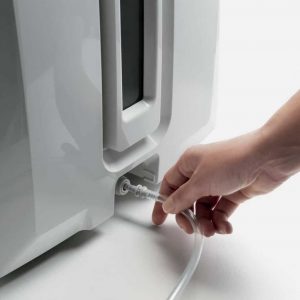
Photo credit: houseweather.org
Capacity of Dehumidification
Some devices are designed to eliminate only a limited amount of moisture from the air. Meanwhile, others are made to work in extreme conditions of humidity. Before you purchase a dehumidifier, you need to evaluate your dehumidification needs and choose a model that caters to them best.
Area To Be Covered
Another important thing to remember is the size of the room(s) where you plan on using the dehumidifier. It is important to understand that while some units may perform with equal efficiency, they may be designed to do so in different sized rooms. So you need to know what size of room your chosen device is recommended for.
Review of the Best Dehumidifiers With Pumps
With a clear view in mind of what kind of features you want from your dehumidifier, along with a pump, it is now time to start looking at units that would make an excellent purchase. To save both the time and effort of going through any and every humidifier you come across, we have reviewed the best dehumidifiers with pumps for your convenience.
Best Overall:
Ivation Energy Star Dehumidifier

PROS
CONS
There are a number of outstanding products you may come across, but only one is best suited for any given category. And when it comes to dehumidifiers with pumps, this Energy Star Dehumidifier by Ivation just steals the show. You will find the device efficiently eliminating the moisture and pumping it out, all at your convenience.
This device is an efficient one that comes in a surprisingly compact size. And we absolutely love how the size of the device in no way impairs its powerful functioning. This allows the device to be placed conveniently wherever you want.
Furthermore, it also comes with wheels, making it easy to move around. So you can roll the unit around and turn on either of the two fan settings for effective moisture removal.
This unit is not only compact and efficient, but also smart. It features a tech-savvy system that allows you to control the level of moisture in the room through a smart LCD interface. This will allow you to not only to check the humidistat and receive filter and reservoir alerts, but also to set your desired level of humidity and adjust the fan speed and timer.
Bottom Line
If you’re looking for the best dehumidifier with a pump, this is where your search ends. It provides all the features you would want from a dehumidifier, including convenience. And that is why this unit tops our list.
Runner-up:
TOSOT Energy Star Dehumidifier

PROS
CONS
TOSOT is a known and trusted brand for dehumidifiers, and this Energy Star dehumidifier makes it to a close second when talking about the best dehumidifiers with a pump. It guarantees satisfaction for its buyers and convenience like no other model.
This 70-pint dehumidifier will make sure that the entire space of your room is being dehumidified, even is the room is large-sized. The unit has a capacity of nine gallons, making it ideal for use in open areas, all while ensuring efficiency of the moisture elimination from the air.
The best thing about this unit is that it is Energy Star rated, implying that it uses a minimal amount of energy. This not only makes it good for the betterment of the environment but also makes the device less heavy on your pockets.
Bottom Line
Tosot has come up with a number of outstanding devices to make the name it currently has, and this dehumidifier is definitely one of them. It's packed with all the features you need to bring down the humidity and serves as one of the best units you could invest in.
Best for the Money:
Inofia Dehumidifier

PROS
CONS
Not all of the best products have to empty your pockets. Just like this Inofia Dehumidifier, certain products allow you to experience the best of function, all while ensuring that your pocket does not face too much damage.
For a dehumidifier designed to fit in a budget, this device really does give you the best of efficiency, with a dehumidification capacity of four gallons in a day. The device will be sure to efficiently bring down the level of humidity down to your desired levels, all with easy operation that turns on and off just at the touch of a single button.
With the pump feature of the dehumidifier comes the choice to switch between hose drainage or the bucket option, for which you’re provided with a built-in 1.8L water tank that doesn’t constantly need to be emptied. So either way, you choose to drain the water, you get the best for your convenience.
Bottom Line
The device comes within a budget range without compromising on functionality. With its smart control, large tank, and efficient timer, this device will be sure to give a run for your money.
Best 30-Pint Model:
Whynter Energy Star 30 Pint Portable Dehumidifier

PROS
CONS
Different houses come with different-sized rooms and that is enough for all of us to have different requirements from our dehumidifiers. If you feel like a 30-pint capacity would work perfectly for your room, then look no further than this Energy Star 30 pint portable dehumidifier.
The top feature of this dehumidifier, after its pump, is its auto restart feature, which allows the unit to restore the programmed settings after a power outage. To complement this feature, it also has an automatic shut-off option that allows the device to shut down automatically when the tank is filled. These options allow the device to function without hassle and constant supervision.
The frost accumulation of dehumidifiers is a pain that anyone with a dehumidifier is aware of. To avoid the trouble of dealing with this issue, this also features an automatic defrost function that prevents the frost from building up in the first place.
Bottom Line
For a 30-pint model, this device functions exceptionally well, providing you with nothing less than the best in functionality. It’s portable design and automatic functions make this unit a must-buy for anyone looking for a new dehumidifier.
Best for Crawl Spaces:
AlorAir Basement/Crawlspace Dehumidifier

PROS
CONS
Crawl spaces can easily mount up high levels of humidity in no time. The worst part about such a situation is the amount of mold that can grow and accumulate in no time. In order to ensure you don’t witness such a time, it is wise to invest in a good dehumidifier that would ideally work for such spaces, just like this AlorAir dehumidifier.
What we absolutely love about this dehumidifier is its HGV system. Sounds foreign? Let us explain it to you. HGV is basically a hot gas valve defrosting system that quickly and efficiently defrosts the icing up that usually takes place inside a dehumidifier to ensure optimal functioning of the unit.
The device further features internal corrosion protection that will make sure the unit does not undergo any sort of corrosion or leaks, both of which are very common in dehumidifiers, given the environment these devices usually work in. So you get the best of functionality out of these devices with the assurance that they will also last longer. Isn’t that a win-win situation?
Bottom Line
We all need to ensure that our crawl spaces are kept at acceptable levels of humidity and no device other than this would serve better at the given job. From its internal corrosion resistance to its convenient functioning, all the features of this device make it the perfect one for you.
Best Dehumidifier With Pump for Basement:
hOmeLabs HME020031N

PROS
CONS
Arguably one of the best dehumidifiers available, the hOmelabs HME020031N Dehumidifier comes with a sleek, clean look.
What Recent Buyers Report
Most reviewers are pleased with this device’s user-friendly and quiet performance. However, some complained about the tank’s small size and lack of durability.
Why it Stands Out to Us
This hOmelabs dehumidifier has a lot of attractive features, including a low noise level and a turbo mode feature, which increases the fan speed to remove more excess moisture. This makes it ideal for bigger rooms of up to 15.4 x 11 x 24.3 inches.
Bottom Line
This dehumidifier unit is an ideal high-performance device for large rooms and commercial use. However, it uses a lot of electricity.
Best Hisense Dehumidifier With Pump:
Hisense DH-7019KP1WG

PROS
CONS
The Hisense DH-7019KP1WG is ideal for anyone looking for a low-budget dehumidifier that offers optimum performance.
What Recent Buyers Report
Customers regard this product as a quality basement dehumidifier that effectively eliminates excess moisture. Many reviewers liked the digital display and alarm that alerts you when it’s time to empty the water bucket. However, some have taken issue with its durability, with a few complaining that they had to replace their dehumidifiers in less than a year.
Why it Stands Out to Us
The alarm system is an outstanding feature that helps avoid unnecessary spillage. Additionally, the digital display is aesthetically pleasing and easy to read. The auto-restart and frost control is also impressive features.
Bottom Line
The Hisense DH-7019KP1WG is the way to go if you are looking for a budget-friendly basement dehumidifier that will remove excess moisture. It’s easy to operate and energy-efficient.
Best Commercial Dehumidifier With Pump:
BlueDri BD-76

PROS
CONS
The BlueDri BD-76 is an ideal large-capacity dehumidifier for commercial use.
What Recent Buyers Report
From the extreme power to its efficiency at removing excess moisture, reviewers find that this device is well worth the big bucks.
Why it Stands Out to Us
Despite being the most expensive dehumidifier on this list, the BlueDri BD-76 is guaranteed to give you your money's worth. It has a high-efficiency rotary compressor that ensures maximum moisture extraction to maintain a comfortable humidity level. On average, it removes up to double the amount of water per day than a normal 70-pint capacity home dehumidifier. This device also has a digital panel, compact electrical control with auto-restart, hour counter, RH, and temperature sensors. The best part is that it can be used for water damage restoration.
Bottom Line
This is one of the best commercial and large-scale dehumidifiers on the market. It has a strong and robust design that enables it to withstand the toughest environments, making it ideal for commercial and industrial use. Although it may leave a big dent in your pocket, it’s worth every penny.
9. BLACK + DECKER 70 Pint Energy Star Dehumidifier

PROS
CONS
There are no two views on the fact that a basement in the house is the most prone to excessive humidification. Even a little negligence on that aspect could cause great, as the basement is where the foundation of the house lies. In order to make sure that you opt for the best for your basement, this 70-pint Energy Star dehumidifier is the ideal option to go with.
The unit will not only eliminate up to 70 pints of moisture from the air in a day, but also uses its internal pump to drain the water not just horizontally from a hose, but can push it up vertically as well, if the need be.
The device also features a 24-hour time, an adjustable thermostat, and three varying speeds for the fan that allow you complete control over the unit’s functioning. And if that isn’t enough, it also comes with an auto shut-off, auto restart, and auto defrost functions that all add to your convenience.
Bottom Line
Basements, of all places, desperately need a good dehumidifier to keep things running smoothly, and we believe that this device will provide you with all the best features a dehumidifier in a basement would need.
Best 50-Pint Model:
Whynter Energy Star 50 Pint Portable Pump Dehumidifier

PROS
CONS
If you feel like the 30-pint model won’t cut it for you, you might want to move up a step and try a 50-pint model instead. For that, we highly recommend this Energy Star Portable Pump by Whynter that will amaze you with its dehumidification capabilities.
With this 50-pint model, you get a 14-pint removable water bucket, which can extract up to about seven liters of moisture. So one thing is for sure, you won’t spend a lot of time emptying the tank since it will take a while to fill up. But being a pump dehumidifier, you always have the option to drain the water through a hose for added convenience.
The device operates efficiently without making noise above 58.5 decibels. With this quiet functioning, the unit will work to reduce the humidity up to 85% of the given humidity of the room. And if that is not enough, the unit also offers an automatic restart and shut-off option!
Bottom Line
Of all the 50-pint models that you may find, this one is definitely a winner. All of its features are designed to ensure not only prompt functioning but also user convenience, which makes it the best of the best. Needless to say, this unit, when used with an extension cord, simply won’t disappoint you.
Best 70 Pint Model:
DeLonghi Energy Star 70 Pint Dehumidifier
No products found.
PROS
CONS
The biggest rooms require a dehumidifier model with the greatest capacity. So if that is what you’re looking for, then a 70-pint model would work wonders for you, and the DeLonghi Energy star 70-pint model is the perfect choice, providing you with all the features you need.
With this dehumidifier, you will experience an obvious change in the levels of humidity. You will see how efficiently the device works by the noticeably easier breathing after the unit has run a couple of cycles. All the while, it ensures energy consumption is kept at a minimum, given its Energy Star rating.
The 70-pint model is ideal for use in rooms as large as 1000 square feet. It covers such a large amount of space while continuously draining out the water, so you don’t have to eventually deal with the hassle of emptying a tank.
Bottom Line
A bigger model covering a greater space of area would definitely take a little more time than the standard. If you can look past the little time lag the unit comes with, it is the best option in the 70-pint models. Everything about this unit is on-point, from its industrial strength dehumidification to its AAFA certification.
Quietest Dehumidifier With Pump:
Frigidaire FFAP7033T1

PROS
CONS
Dehumidifiers, though very important, can still manage to be unbearable with all the noise they make. Such noise can be very disturbing, specifically for those who do work that requires great attention. For such people, who want a dehumidifier that not only works effectively but also quietly, this model is the perfect option.
The best feature of this dehumidifier, alongside its quiet functioning, is its efficacy. It manages to filter out a striking amount of 70 pints of moisture from the air in a day using the standard 115-volt outlet. Not only does it remove the excess moisture but it also eliminates a number of bacteria present in the air that you breathe, contributing to a healthier life.
What’s more is that this unit is not only certified by various accepted standard but is also digitalized with a screen that provides ready-select options, a humidity readout, and a 24-hour timer along with a control lock. All these ensure that you get the best user experience.
Bottom Line
This device works extremely well and is equally quiet too. The lack of noise produced by the unit has no impact on the impressive functioning, which is all we ask for. But it provides us with more, filtering the air of bacteria as well. And there is nothing more one could look for in a dehumidifier, making this the perfect choice for anyone.
What Are The Benefits of Having a Pump on a Dehumidifier?
A dehumidifier with a pump does help, but how exactly? What is so great about dehumidifiers with pumps? The answer is simple, they offer you something we all look for while considering any sort of product; convenience.
Variety of Options
Dehumidifiers with pumps are available as permanent dehumidifiers as well as portable ones. This gives users the liberty of choosing the type of dehumidifier to suit their specific needs, and not be restricted to a certain choice due to limited options.
Easy Positioning
If you’re using a dehumidifier without a pump, your unit will depend upon gravity to drain the water, restricting you to placing the unit on an elevated surface for the proper drainage of water. But a dehumidifier with a pump has a system to pump water out, allowing you to place your unit anywhere you wish, without the restriction of an elevated position.
Greater Reach
Since the water in these dehumidifiers is being pumped out, the water can be easily drained through longer hoses that are almost as long as 15 feet. This type of unit will have a greater reach across the house. You will not be restricted to place your unit close to the drain and can be put almost anywhere around the house.
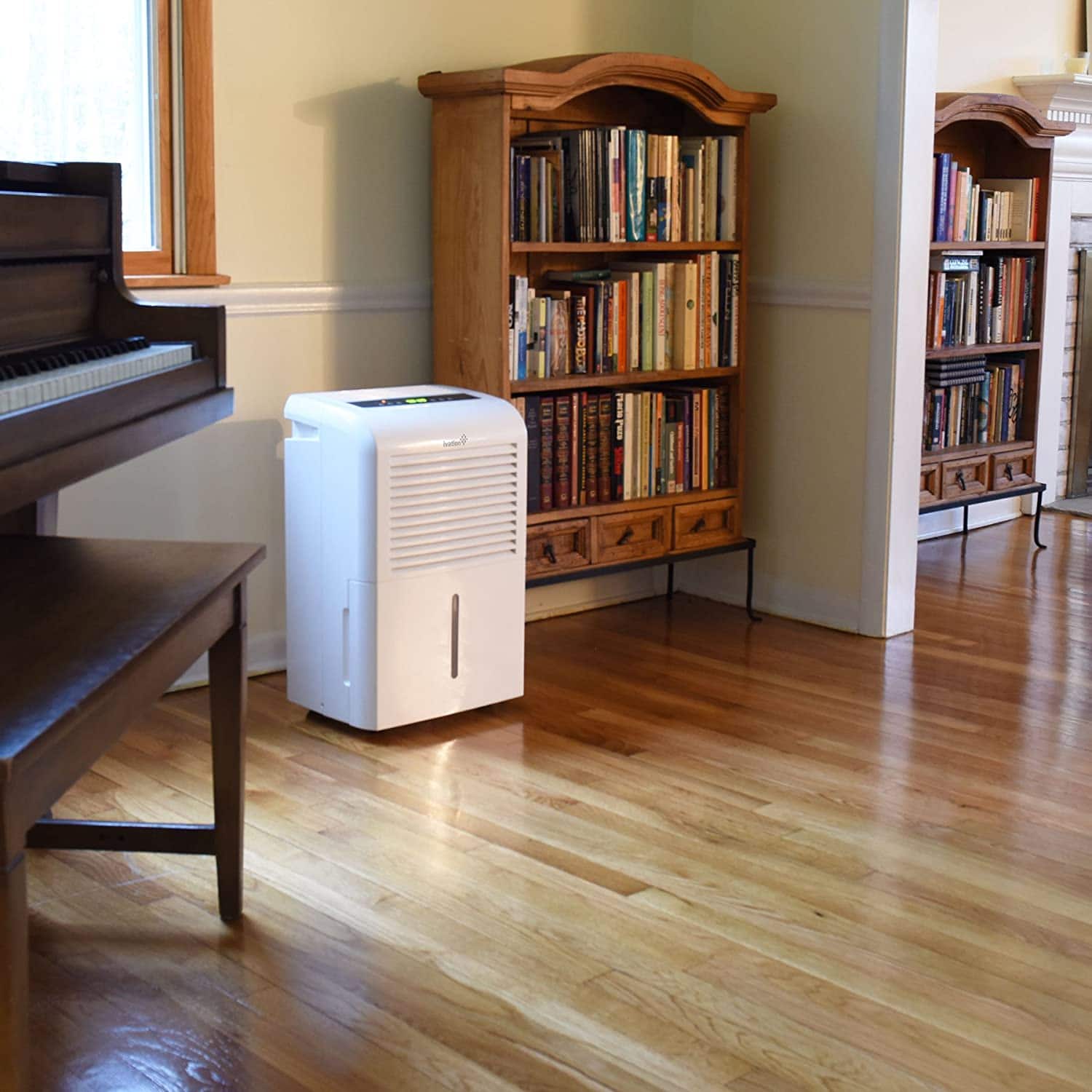
Ivation Energy Star Dehumidifier
Pros and Cons of a Dehumidifier with a Built-In Pump
Here are the pros and cons of a dehumidifier with a built-in pump:
Pros
Convenience – You don’t need to constantly monitor the dehumidifier since the pump can drain water from the reservoir itself.
Avoids Spillage - The drain hose directs water out of the bucket so you don’t have to worry about it filling up and spilling over.
Peace of Mind – The pump gives you peace of mind and allows you to avoid the dread of walking into a flooded basement.
Cons
These kinds of dehumidifiers tend to be more expensive because the built-in pump comes at an extra cost and may require maintenance.
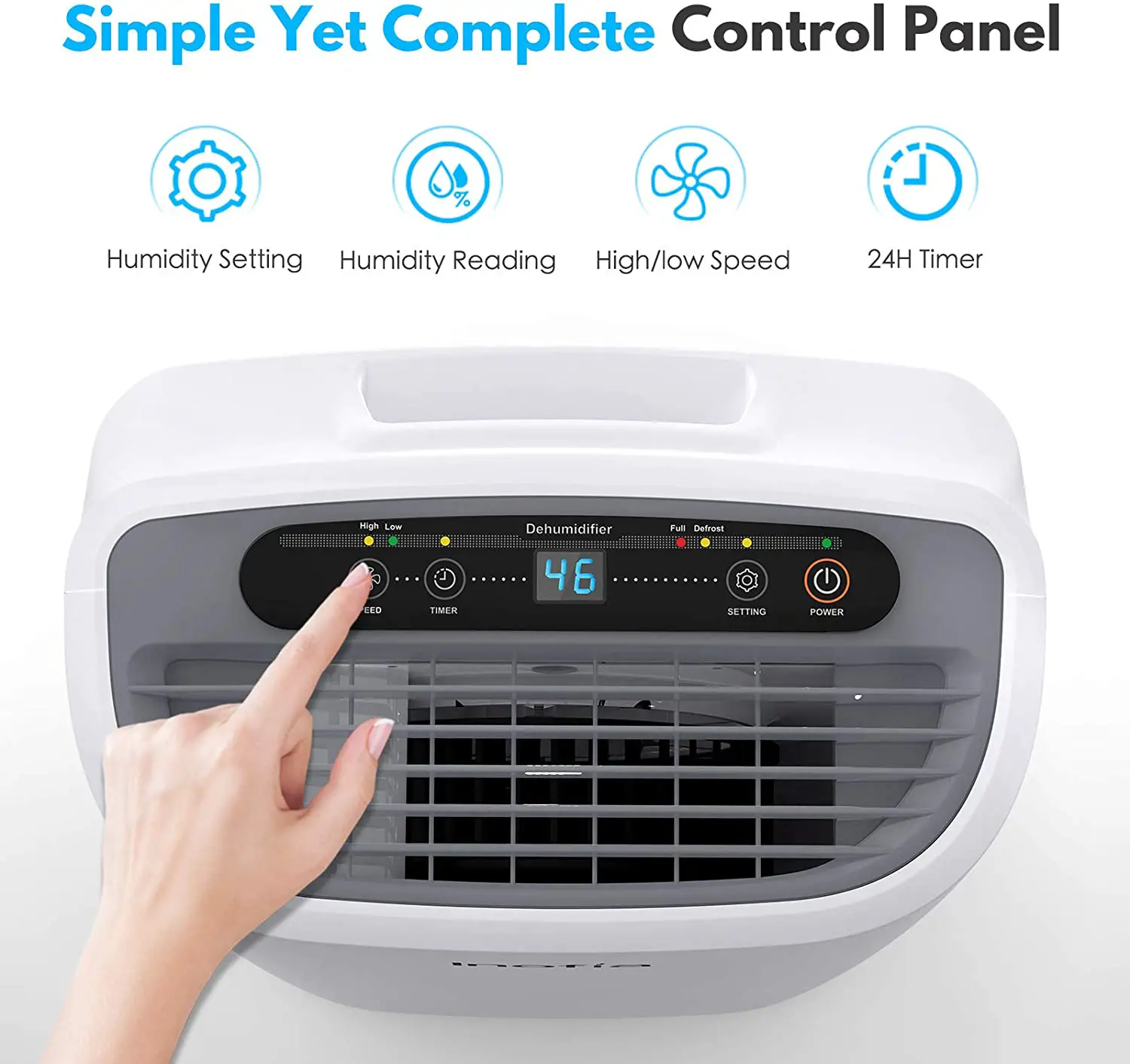
Inofia Dehumidifier
Does It Matter What Size Dehumidifier If I Buy One With a Pump?
The size will always matter regardless of whether you buy a dehumidifier with a pump or not since these devices are rated by the amount of excess moisture they’ll extract from the air in 24 hours. For example, a dehumidifier with a rating of 50 pints will remove 50 pints of moisture in a day.
Dehumidifier Pump vs No Pump - Comparison Overview
Dehumidifiers with a pump and those without are suited to serve different people depending on the brand and make. It’s up to you to find out which one works best.
Similarities
- They’re both equipped for moisture removal and maintaining air quality. Whether it has a pump or not, your dehumidifier will extract excess moisture from your indoor area.
- Both dehumidifiers tend to have a wide operating temperature range as well as high energy efficiency and low running costs.
Differences
- The key difference is the pump. Dehumidifiers with a pump tend to have a high dehumidification capacity as the water collected is immediately drained out.
- Dehumidifiers with a pump tend to have higher initial and maintenance costs because they have more parts that need servicing and maintenance.
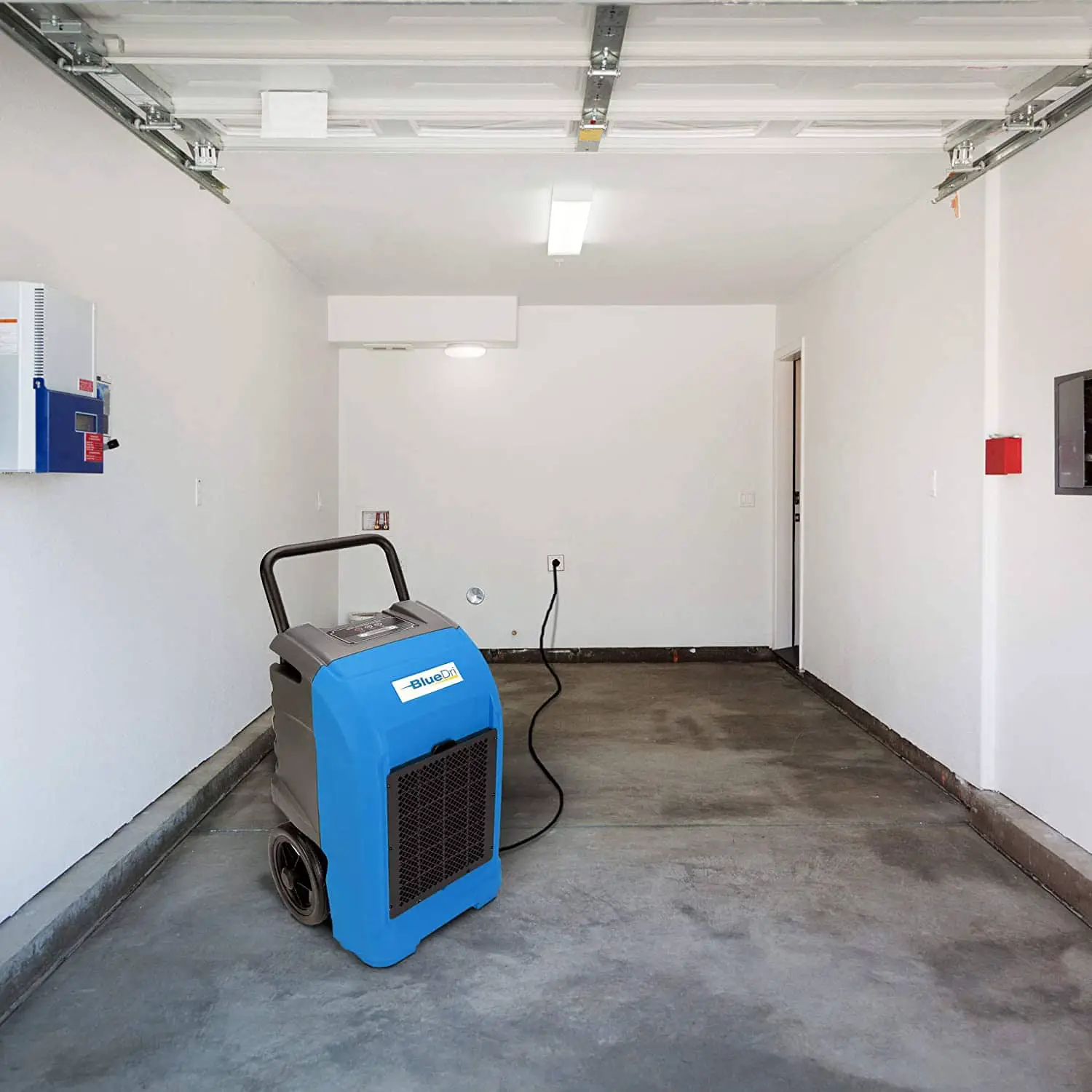
BlueDri BD-76
How to Install Condensate Pump For Dehumidifier
Directions to installing a condensate pump can vary depending on the pump and brand of the dehumidifier. Therefore, you must review the setup directions in case the manufacturer has special instructions. If not, you can follow these easy steps:
1. Attach the first hose
Connect the first hose to the back of your dehumidifier at the drain port. Place the other end into the hole at the top of the condensate pump. The hose should fit perfectly so that water doesn’t have any trouble going into the pump.
2. Attach the second hose
Connect the second hose - preferably the smaller one to increase pressure - from the pump to the place where you want to drain the water. A good option is the existing tubing coming from the air-conditioner pump. Cut a section of the tubing and attach a T-fitting so water coming from the dehumidifier and the AC unit can all drain in the same place.
3. Turn on the pump and test it out.
Turn on the pump and dehumidifier. If necessary, you can pour some water into the condensate tub to ensure that everything is working properly. Refer to the video below if you have any doubts for a full and detailed overview.
Conclusion
Dehumidifiers are very useful devices, and when paired with a pump, they become one of the most convenient solutions to high levels of humidity. If you concentrate on all the right aspects of the dehumidifier and invest in the right unit, you will find a lot of your problems from growing mold to uncomfortable breathing being resolved.
People Also Ask
Below are some of the most asked questions concerning dehumidifiers with built-in pumps.
What is a Built-in Pump in a Dehumidifier?
This is a relatively small device that directs water out from a dehumidifier’s reservoir. The pump is usually connected to a hose that will drain the water into a sink, outside or any other place you prefer.
What Power Condensate Pump Do I Need for a Dehumidifier?
Dehumidifiers with different sizes and capacities require different power pumps. For example, a 300-pint dehumidifier won’t require the same power pump as a 30-pint dehumidifier. Consult the manufacturer on what power pump will be appropriate for your dehumidifier.
How Do I Test a Dehumidifier Pump?
Fill a bucket with water and then connect the pump to the bucket. Make sure you have a clear drainage destination, or things can get messy.
How Do You Drain a Dehumidifier Using a Condensation Pump?
You’ll need two hoses and external drainage. Connect the first hose from the back of the dehumidifier to the condensation pump.
The other hose should be connected from the pump to the external drainage. Now, any water that collects at the back of the dehumidifier will be pumped into the drainage.
Do Dehumidifiers With Pumps Consume More Energy Than No-Pump Models?
Yes, they do. Normal dehumidifiers depend upon the force of gravity for the water to be drained. And as we all know, gravity is a natural force, requiring no extra energy for it to work.
So standard dehumidifiers use no energy for the water to be drained.
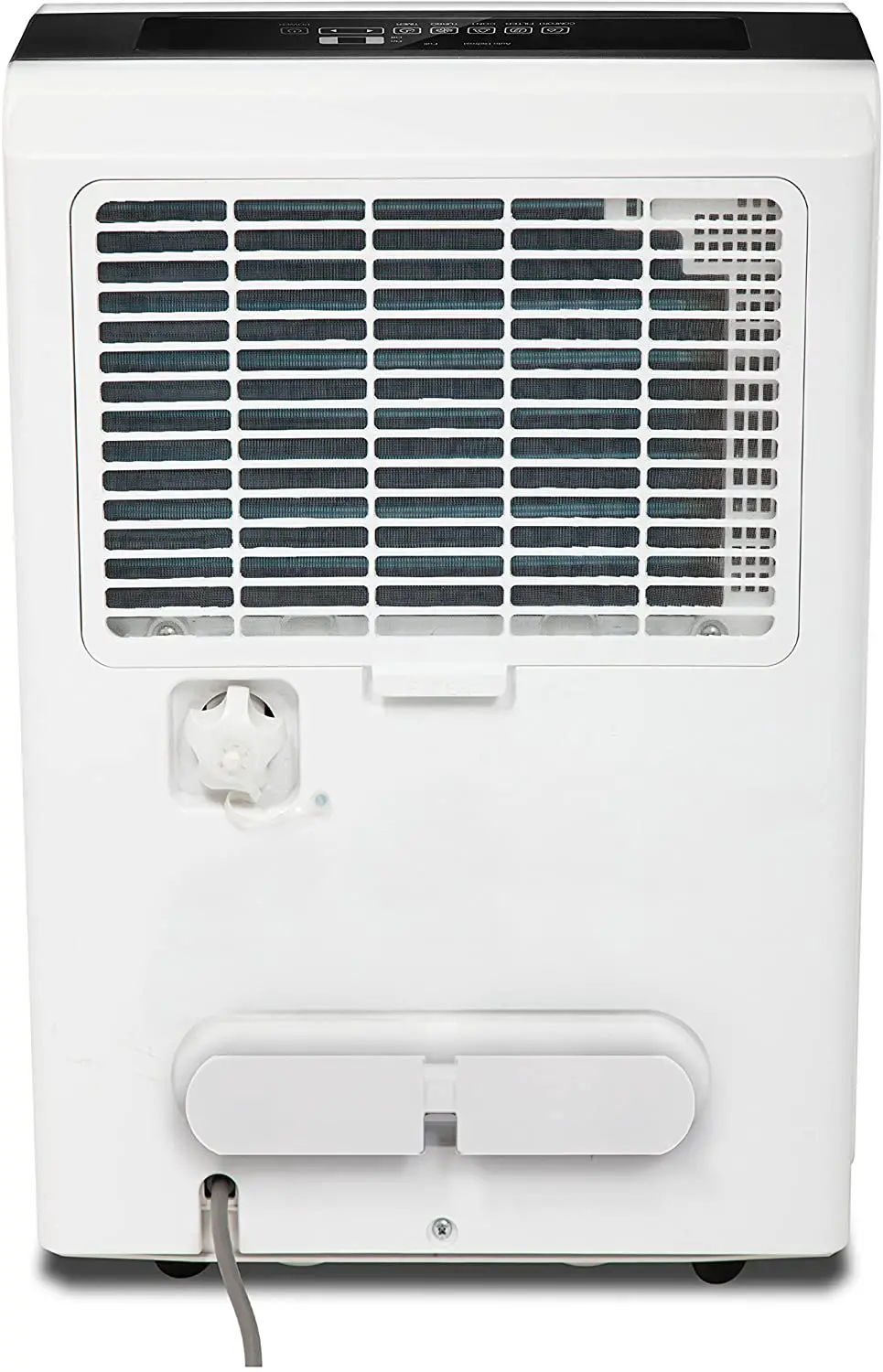
Whynter Energy Star 30 Pint Portable Dehumidifier
A dehumidifier with a pump is different. The water that needs to be drained is pumped out through a hose. For that, energy is required to pump the water against the force of gravity, if it has to be drained through a window or an elevated space.
So a dehumidifier with pump uses energy for the dehumidification process, as well as water drainage, while standard units use energy just for the former, accounting for the difference in energy consumption.
What Are The Types of Dehumidifiers With Pumps?
Dehumidifiers that come with a pump are mainly of two types.
